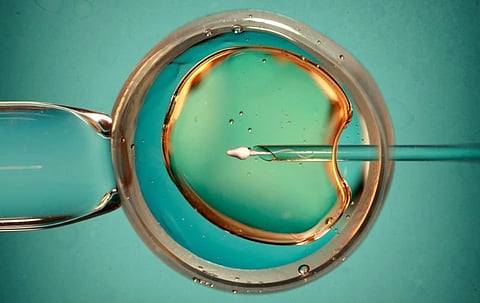THURSDAY, Feb. 22, 2024 (HealthDay News) -- Intracytoplasmic sperm injection (ICSI) does not improve the live birth rate versus conventional in vitro fertilization (IVF), according to a study published online Feb. 5 in The Lancet.
Yuanyuan Wang, Ph.D., from Peking University Third Hospital in Beijing, and colleagues randomly assigned couples with infertility with nonsevere male factor who did not have a history of poor fertilization to undergo either ICSI (1,154 couples) or conventional IVF (1,175 couples).
The researchers found that live birth after first embryo transfer occurred in 33.8 percent of couples in the ICSI group and in 36.6 percent of couples in the conventional IVF group (adjusted risk ratio, 0.92; 95 percent confidence interval, 0.83 to 1.03). Two neonatal deaths occurred in the ICSI group versus one in the conventional IVF group.
"Given that ICSI is an invasive procedure associated with additional costs and potential increased risks to offspring health, routine use is not recommended in this population," the authors write. "Additionally, ICSI is an invasive procedure that bypasses natural selection barriers during the fertilization process; therefore, concerns have been raised over its potential risks to offspring health, including congenital anomalies, neurodevelopment delays, and mental disorders."
One author disclosed ties to industry.
Abstract/Full Text (subscription or payment may be required)
Editorial (subscription or payment may be required)


